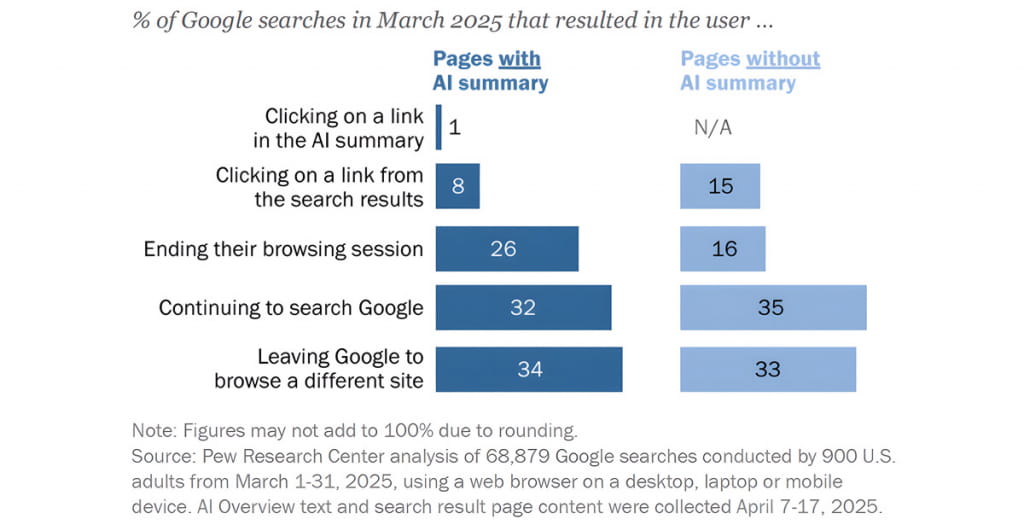Millions of entrepreneurs around the world have spent years mastering one art: how to get #Google to show their sites at the top of the search results. They hired experts, analyzed algorithms, created content under strict requirements of the search engine. And suddenly, this art has become useless.
Revolution in user behavior
Try going to Google right now and asking any question. A neat block with the answer in plain Russian will appear at the top of the page — no links, no transitions to third-party sites. Why click further if the answer is already received?
A fundamental change is happening not in technology, but in human habits. We are no longer searching for information; we are starting to demand it. Google is transforming from a navigator into an oracle — you ask a question and receive a ready answer.
This transformation seems natural and convenient, but it conceals a revolutionary shift in the information ecosystem. The intermediate link between the question and the answer is disappearing. The user no longer travels through websites in search of the needed data — the data materialize right in front of them.
Agony of digital marketing
When artificial intelligence began providing direct answers to user questions, an entire philosophy of internet business collapsed. Previously, success was measured by the number of visits to the site — the more clicks, the higher the profit. Now clicks are disappearing because the need for them is vanishing.
Imagine the owner of a chain of jewelry stores who has invested five years in promoting an online catalog. Today, a customer asks Google 'which diamonds are best to buy' and receives a comprehensive answer right in the search bar. Why go to the jeweler's website if all the necessary information is already in front of them?
The multibillion-dollar digital promotion industry is experiencing an existential shock. The rules of the game that seemed unshakeable are being rewritten before our eyes. Website promotion specialists are forced to learn fundamentally new approaches, the essence of which few understand so far.
According to analysts' forecasts, the implementation of generative artificial intelligence in search engines could significantly reduce traffic to source websites. This is not just statistics — it is a death sentence for millions of internet projects built on a traffic attraction model.
Apocalypse live
These changes are especially catastrophic for the news industry. For twenty years, newspapers and magazines learned to survive in the digital world — creating websites, mastering social media, building subscription models. Many learned to earn from advertising tied to site traffic. It seemed the worst was behind.
Statistics published by the Pew Research Center and other research centers demonstrate a catastrophic decline in traffic to news sites. For a media business built on advertising revenue from visits, this means direct financial losses in the millions of dollars.

An unprecedented situation arises: journalists spend weeks investigating corruption schemes, interviewing witnesses, studying documents, fact-checking. And the reader receives a summary of their work through an automatic summary generated by artificial intelligence, not even suspecting who stood behind that information.
Editorial offices are massively cutting staff. Local publications that covered the lives of small towns are closing one after another. Quality journalism, which requires time and resources, is giving way to superficial automatic summaries. Media experts openly talk about a lethal blow to the traditional press — if it used to compete with bloggers and social media, it is now battling the very logic of news consumption.
For news sites, this is not just a crisis — it is an existential threat. Without traffic, there is no advertising revenue; without revenue, there is no ability to support journalists; without journalists, there is no content. A vicious circle that could lead to the collapse of the entire news production system.
Revolution devours its own children
The most amazing thing about what is happening is that Google is destroying its own business model, which brought in tens of billions of dollars annually. The company made a fortune connecting users with content. Now it is eliminating the need for that connection.
This is a classic example of a technological dilemma: to keep up with competitors in the AI race, Google is forced to undermine the foundations of its own success. The search engine created an entire ecosystem of the internet economy, and now that ecosystem is being consumed.
It is difficult to predict the long-term consequences. If content creators stop getting rewarded for their work through site visits, what will be the incentive to produce quality information? Perhaps we are heading towards an information crisis when data sources for artificial intelligence begin to dry up.
'Revolution devours its own children,' said Danton, and was immediately executed. Today, the digital revolution is devouring Google. The difference is that this time the executioner is not the crowd but progress — a much more ruthless and relentless judge.